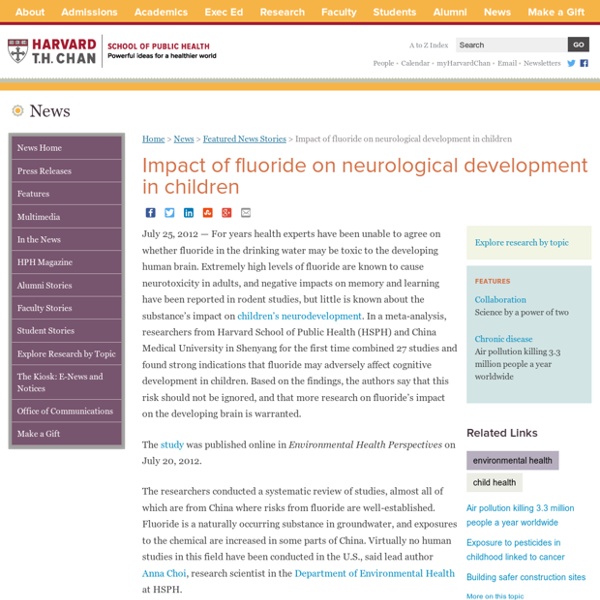Impact of Fluoride on Neurological Development in Children - July 25, 2012 -Features

Coconut Oil
How many times must we quote that dark character from the movie (and book), All The President’s Men, by the name of "Deep Throat?" His statement is simple, but charged: "Follow the money." Fats, fats, fats. The purpose of this article is to break through the junk science we’ve all been spoon fed and bring to light some of the truth about fats. The American Heart Association (and a sundry of organizations supposedly supporting your healthy heart) since the fifties have been telling us to eat margarine and polyunsaturated oils for good heart health. In 1998, the American Heart Association, in the face of overwhelming evidence (and the fact that Americans can actually read) finally came out telling us to limit our intake of trans fats, the main ingredient in margarine. Trans fats are also called partially hydrogenated oils. Here's something that you probably don't know: the oils in your store, on those shelves, looking golden and clear, are ALREADY RANCID. So? Medium chain fatty acid.
Hemp Building Materials
Learn how Hemp Building Materials are used and why! Hemp has had a bad reputation for sometime now. People hear “hemp” and immediately flash to marijuana. Yes – marijuana is the leafy part of a plant, but the rest is hemp, a fibrous and strong plant that is used to make anything from paper and clothing to bags and even houses. Hemp is a very versatile fiber that can be manufactured into a variety of products that resemble wood including fiberboard, wallboard, roofing tiles, insulation, paneling and bricks can even be made from the compressed hurds. You can even make foundations from the compressed hurds. Cited as being half as light, seven times stronger and three times more pliable this superiority in strength and flexibility makes “hempcrete” and ideal building material in earthquake prone zones. Homes can be made nearly 100% out of hemp materials. Hemp has even been used to created hemp-based paints.
The Illusion of Reality - Consciousness & Quantum Theory
The Worst Noises in the World: Why We Recoil at Unpleasant Sounds « Neuroscience « WiSci | Life Sciences Blog
Heightened activity between the emotional and auditory parts of the brain explains why the sound of chalk on a blackboard or a knife on a bottle is so unpleasant. In a study published today in the Journal of Neuroscience and funded by the Wellcome Trust, Newcastle University scientists reveal the interaction between the region of the brain that processes sound, the auditory cortex, and the amygdala, which is active in the processing of negative emotions when we hear unpleasant sounds. Brain imaging has shown that when we hear an unpleasant noise the amygdala modulates the response of the auditory cortex heightening activity and provoking our negative reaction. “It appears there is something very primitive kicking in,” says Dr Sukhbinder Kumar, the paper’s author from Newcastle University. “It’s a possible distress signal from the amygdala to the auditory cortex.” Most Unpleasant Sounds Rating 74 sounds, people found the most unpleasant noises to be: Least Unpleasant Sounds
Related:
Related:



